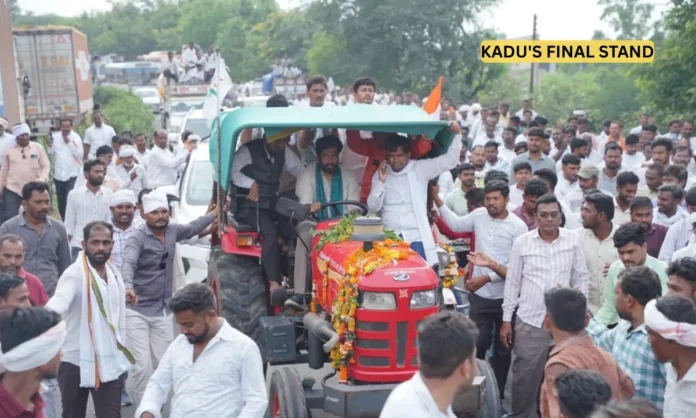Key Highlights
- Former MLA Bachchu Kadu leads 15,000 farmers in blocking National Highway 44 near Nagpur, demanding complete farm loan waiver
- Bombay High Court orders protesters to vacate highway by 6 PM, citing 20-kilometer traffic jams affecting public transportation
- Maharashtra government confirms ₹31,628 crore compensation package for farmers affected by September monsoon devastation
Opening Overview
The Maharashtra farmers’ highway protest reached a critical juncture on October 30, 2025, as former MLA Bachchu Kadu announced his decision to shift the massive demonstration from National Highway 44 following a Bombay High Court directive. The Maharashtra farmers’ highway protest, led by Prahar Janshakti Party chief Kadu, has blocked the strategic Nagpur-Wardha road for two consecutive days, bringing together over 15,000 farmers demanding an unconditional farm loan waiver.\
दुसऱ्या दिवसाचा प्रवास सुरू…
— BACCHU KADU (@RealBacchuKadu) October 28, 2025
वर्धा ते नागपूर या मार्गावर शेतकऱ्यांचा ऐतिहासिक लढा पुढे सरकतोय!
महाराष्ट्राच्या कानाकोपऱ्यातून आलेले लाखो शेतकरी नागपूरात एकत्र जमणार — आणि इतिहास घडवणार हे निश्चित आहे.
आवाज एकच… “हक्कासाठी लढा, झुकणार नाही कधी!”
महाएल्गार — नागपूर pic.twitter.com/q6EvWZTfCU
This Maharashtra farmers’ highway protest emerged as monsoon-ravaged agricultural communities across 30 districts continue grappling with unprecedented crop losses exceeding 69.95 lakh acres, intensifying calls for comprehensive debt relief measures. The Maharashtra farmers’ highway protest represents the culmination of mounting agricultural distress in a state where farmers face dual challenges of weather-induced crop destruction and mounting institutional debt burdens.
Court Intervention and Government Response
The Bombay High Court’s suo motu intervention in the Maharashtra farmers’ highway protest demonstrated judicial concern over public inconvenience caused by the 20-kilometer traffic congestion on one of India’s busiest transportation corridors. Justice took cognizance of newspaper reports highlighting how the Maharashtra farmers’ highway protest had paralyzed ambulance services and essential travel, violating citizens’ fundamental right to movement. State ministers Pankaj Bhoyar and Ashish Jaiswal conducted intensive negotiations with protest leaders, conveying Chief Minister Devendra Fadnavis’s invitation for discussions in Mumbai. The Maharashtra farmers’ highway protest leadership initially resisted relocation demands, with Kadu declaring his willingness to court arrest rather than abandon the strategic highway position.
- Bombay High Court issues 6 PM deadline for highway clearance citing public safety concerns
- State ministers offer high-level talks in Mumbai as alternative to continued road blockade
Crop Devastation Fuels Agricultural Unrest
Official data from Maharashtra’s Agriculture Department reveals the scale of destruction that precipitated the Maharashtra farmers’ highway protest, with September 2025 monsoon causing crop damage across 30.85 lakh acres in a single month. The Maharashtra farmers’ highway protest gains legitimacy from unprecedented agricultural losses totaling 69.95 lakh acres between August and September, affecting 195 tehsils and 654 revenue circles statewide. Nanded district bore the heaviest impact with 18.20 lakh acres of damaged cropland, followed by Solapur (9.95 lakh acres), Yavatmal (8.56 lakh acres), and Dharashiv (8.29 lakh acres). The Maharashtra farmers’ highway protest encompasses demands for comprehensive debt relief as affected crops include soybean, maize, cotton, urad, tur (pigeon pea), and moong varieties essential to the state’s agricultural economy.
- September alone witnessed crop destruction across 30.85 lakh acres in Maharashtra
- Eight districts reported individual losses exceeding one lakh acres each
Political Dynamics and Electoral Implications
Chief Minister Devendra Fadnavis addressed the Maharashtra farmers’ highway protest by emphasizing government commitment to farm loan waivers while cautioning against immediate announcements without proper verification mechanisms. The Maharashtra farmers’ highway protest occurs against the backdrop of upcoming assembly elections, where agricultural policy promises significantly influence rural voting patterns across the state’s 36 districts. Revenue Minister Chandrashekhar Bawankule reiterated government intentions to implement loan waivers exclusively for genuine farmers, excluding those who misused agricultural loans for non-farming purposes like farmhouse construction. The Maharashtra farmers’ highway protest leadership rejected initial offers for Mumbai negotiations, demanding that government officials engage directly at the protest site near Jamtha flyover.
- Government establishes high-powered committee under former chief secretary Praveen Pardeshi for long-term debt solutions
- State announces ₹31,628 crore compensation package addressing immediate monsoon damage concerns
Closing Assessment
The resolution of the Maharashtra farmers’ highway protest through judicial intervention and political negotiation represents a temporary reprieve in Maharashtra’s escalating agricultural crisis, yet underlying structural issues persist unaddressed. The Maharashtra farmers’ highway protest succeeded in compelling government attention toward farmer distress, though the transition from highway blockade to conference room discussions remains fraught with uncertainty regarding concrete policy outcomes.
As Bachchu Kadu prepares for crucial talks with Chief Minister Fadnavis, the Maharashtra farmers’ highway protest has established a precedent for organized agricultural resistance in India’s most politically significant states. The Maharashtra farmers’ highway protest ultimately underscores the urgent need for comprehensive agricultural reform that addresses both immediate debt relief and long-term structural causes of farmer indebtedness across the subcontinent.


